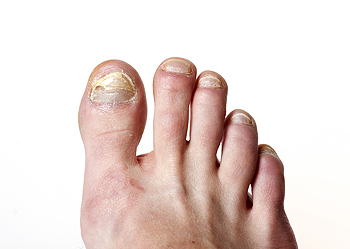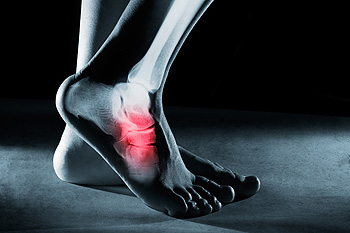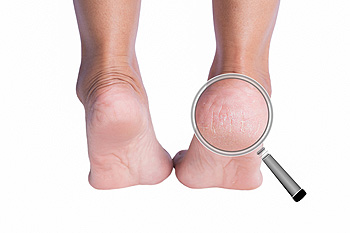Items filtered by date: March 2021
Heel Pain Can Be Treated!
How Plantar Warts Spread
Plantar Warts, and warts in general, are caused by the Human Papilloma Virus (HPV). Plantar warts occur when the virus enters the skin through tiny cracks or weak spots in the skin on the soles of the feet and forms thick, flat warts—sometimes forming clusters. Plantar warts are painful and can make you feel like you are walking on pebbles. Although it is possible for plantar warts to go away on their own, they are hardy and may take years to disappear, if at all. If your plantar warts are causing you pain, discomfort, or embarrassment, contact a podiatrist. There are a variety of therapies and procedures they can use to get rid of plantar warts, including topical treatment, cryotherapy, and laser therapy. For a proper diagnosis please speak with a podiatrist.
Plantar warts can be very uncomfortable. If you need your feet checked, contact one of our podiatrists from William Street Podiatry. Our doctors will assist you with all of your foot and ankle needs.
About Plantar Warts
Plantar warts are the result of HPV, or human papillomavirus, getting into open wounds on the feet. They are mostly found on the heels or balls of the feet.
While plantar warts are generally harmless, those experiencing excessive pain or those suffering from diabetes or a compromised immune system require immediate medical care. Plantar warts are easily diagnosed, usually through scraping off a bit of rough skin or by getting a biopsy.
Symptoms
- Lesions on the bottom of your feet, usually rough and grainy
- Hard or thick callused spots
- Wart seeds, which are small clotted blood vessels that look like little black spots
- Pain, discomfort, or tenderness of your feet when walking or standing
Treatment
- Freezing
- Electric tool removal
- Laser Treatment
- Topical Creams (prescription only)
- Over-the-counter medications
To help prevent developing plantar warts, avoid walking barefoot over abrasive surfaces that can cause cuts or wounds for HPV to get into. Avoiding direct contact with other warts, as well as not picking or rubbing existing warts, can help prevent the further spread of plantar warts. However, if you think you have developed plantar warts, speak to your podiatrist. He or she can diagnose the warts on your feet and recommend the appropriate treatment options.
If you have any questions please feel free to contact one of our offices located in William Street in New York, NY, Forest Hills, NY, and Broadway in New York, NY . We offer the newest diagnostic and treatment technologies for all your foot and ankle needs.
Is Toenail Fungus Contagious?
 Fungal infections of the toenails are a common problem, affecting at least 10% of the adult population. One of the reasons that this type of infection may be so common is because it is contagious. Within an individual, fungal infections can spread from one infected nail to another nail, and from infected nails to the surrounding skin. Having poor foot hygiene, wearing old shoes made with unbreathable materials, sharing personal items like pedicure tools or towels, and walking barefoot in public places can put you at a greater risk of contracting toenail fungus. If you notice the symptoms of a fungal infection in your toenails, such as the nails thickening, changing shape or texture, or becoming discolored, please see a podiatrist for treatment.
Fungal infections of the toenails are a common problem, affecting at least 10% of the adult population. One of the reasons that this type of infection may be so common is because it is contagious. Within an individual, fungal infections can spread from one infected nail to another nail, and from infected nails to the surrounding skin. Having poor foot hygiene, wearing old shoes made with unbreathable materials, sharing personal items like pedicure tools or towels, and walking barefoot in public places can put you at a greater risk of contracting toenail fungus. If you notice the symptoms of a fungal infection in your toenails, such as the nails thickening, changing shape or texture, or becoming discolored, please see a podiatrist for treatment.
For more information about treatment, contact one of our podiatrists of William Street Podiatry. Our doctors can provide the care you need to keep you pain-free and on your feet.
Toenail Fungus Treatment
Toenail fungus is a condition that affects many people and can be especially hard to get rid of. Fortunately, there are several methods to go about treating and avoiding it.
Antifungals & Deterrence
Oral antifungal medicine has been shown to be effective in many cases. It is important to consult with a podiatrist to determine the proper regiment for you, or potentially explore other options.
Applying foot powder on the feet and shoes helps keep the feet free of moisture and sweat.
Sandals or open toed shoes – Wearing these will allow air movement and help keep feet dry. They also expose your feet to light, which fungus cannot tolerate. Socks with moisture wicking material also help as well.
If you have any questions please feel free to contact one of our offices located in William Street in New York, NY, Forest Hills, NY, and Broadway in New York, NY . We offer the newest diagnostic tools and technology to treat your foot and ankle needs.
Different Causes of Foot Pain
 Our feet undergo a lot of use over our lifetime, and as a result, a variety of painful issues can develop. Bunions, which causes the big toe to turn towards the other toes, can lead to a lot of pain while walking. Plantar fasciitis, which is the inflammation of the tendon that runs along the bottom of the foot, can often lead to heel pain and pain in the arch of the foot. Another common source of heel pain is heel spurs. These occur as bony bumps in the heel that are calcium deposits. Other issues, like gout, can lead to a burning sensation in the foot. Gout is caused by an excess of uric acid in the body that builds up in the joints. Some issues can lead to numbness in the foot, and this numbness usually indicates Morton’s neuroma which is the thickening of the nerve around the ball of the foot. If you are struggling with pain in your feet, consulting with a podiatrist is recommended. A podiatrist will be able to help find the source and a proper treatment method.
Our feet undergo a lot of use over our lifetime, and as a result, a variety of painful issues can develop. Bunions, which causes the big toe to turn towards the other toes, can lead to a lot of pain while walking. Plantar fasciitis, which is the inflammation of the tendon that runs along the bottom of the foot, can often lead to heel pain and pain in the arch of the foot. Another common source of heel pain is heel spurs. These occur as bony bumps in the heel that are calcium deposits. Other issues, like gout, can lead to a burning sensation in the foot. Gout is caused by an excess of uric acid in the body that builds up in the joints. Some issues can lead to numbness in the foot, and this numbness usually indicates Morton’s neuroma which is the thickening of the nerve around the ball of the foot. If you are struggling with pain in your feet, consulting with a podiatrist is recommended. A podiatrist will be able to help find the source and a proper treatment method.
Foot Pain
Foot pain can be extremely painful and debilitating. If you have a foot pain, consult with one of our podiatrists from William Street Podiatry. Our doctors will assess your condition and provide you with quality foot and ankle treatment.
Causes
Foot pain is a very broad condition that could be caused by one or more ailments. The most common include:
- Bunions
- Hammertoes
- Plantar Fasciitis
- Bone Spurs
- Corns
- Tarsal Tunnel Syndrome
- Ingrown Toenails
- Arthritis (such as Gout, Rheumatoid, and Osteoarthritis)
- Flat Feet
- Injury (from stress fractures, broken toe, foot, ankle, Achilles tendon ruptures, and sprains)
- And more
Diagnosis
To figure out the cause of foot pain, podiatrists utilize several different methods. This can range from simple visual inspections and sensation tests to X-rays and MRI scans. Prior medical history, family medical history, and any recent physical traumatic events will all be taken into consideration for a proper diagnosis.
Treatment
Treatment depends upon the cause of the foot pain. Whether it is resting, staying off the foot, or having surgery; podiatrists have a number of treatment options available for foot pain.
If you have any questions, please feel free to contact one of our offices located in William Street in New York, NY, Forest Hills, NY, and Broadway in New York, NY . We offer the newest diagnostic and treatment technologies for all your foot care needs.
Signs Your Heel Pain Might Be Plantar Fasciitis
Plantar f asciitis occurs when the plantar fascia, the band that runs along the bottom of the foot from the heel to the toes, becomes inflamed. Plantar fasciitis usually causes pain in the heel, which is often worse in the morning, after prolonged standing, or after an intense workout. Usually, the pain that comes from plantar fasciitis gradually worsens over time. Plantar fasciitis is an overuse injury that comes from an activity that puts stress on the plantar fascia, like running, but it can also be caused by other medical conditions, such as flat feet or obesity. Because plantar fasciitis can negatively impact your daily activities, patients who are suffering from heel pain should be under the care of a podiatrist for a proper diagnosis and treatment plan.
asciitis occurs when the plantar fascia, the band that runs along the bottom of the foot from the heel to the toes, becomes inflamed. Plantar fasciitis usually causes pain in the heel, which is often worse in the morning, after prolonged standing, or after an intense workout. Usually, the pain that comes from plantar fasciitis gradually worsens over time. Plantar fasciitis is an overuse injury that comes from an activity that puts stress on the plantar fascia, like running, but it can also be caused by other medical conditions, such as flat feet or obesity. Because plantar fasciitis can negatively impact your daily activities, patients who are suffering from heel pain should be under the care of a podiatrist for a proper diagnosis and treatment plan.
Plantar fasciitis can be very painful and inconvenient. If you are experiencing heel pain or symptoms of plantar fasciitis, contact one of our podiatrists from William Street Podiatry. Our doctors can provide the care you need to keep you pain-free and on your feet.
What Is Plantar Fasciitis?
Plantar fasciitis is the inflammation of the thick band of tissue that runs along the bottom of your foot, known as the plantar fascia, and causes mild to severe heel pain.
What Causes Plantar Fasciitis?
- Excessive running
- Non-supportive shoes
- Overpronation
- Repeated stretching and tearing of the plantar fascia
How Can It Be Treated?
- Conservative measures – anti-inflammatories, ice packs, stretching exercises, physical therapy, orthotic devices
- Shockwave therapy – sound waves are sent to the affected area to facilitate healing and are usually used for chronic cases of plantar fasciitis
- Surgery – usually only used as a last resort when all else fails. The plantar fascia can be surgically detached from the heel
While very treatable, plantar fasciitis is definitely not something that should be ignored. Especially in severe cases, speaking to your doctor right away is highly recommended to avoid complications and severe heel pain. Your podiatrist can work with you to provide the appropriate treatment options tailored to your condition.
If you have any questions please feel free to contact one of our offices located in William Street in New York, NY, Forest Hills, NY, and Broadway in New York, NY . We offer the newest diagnostic and treatment technologies for all your foot and ankle needs.
Wearing Backless Shoes May Lead to Cracked Heels
The condition that is known as cracked heels is often uncomfortable. Deep cracks in the skin, known as fissures, can create severe pain. Cracked heels can be caused by wearing shoes that are backless, or from standing on hard surfaces for the majority of the day. Additionally, certain medical conditions, including psoriasis and eczema, may lead to the development of cracked heels. Patients who are obese may experience this ailment due to the added weight the feet endure. Mild relief may be found when the feet are washed, dried thoroughly, and a good moisturizer is frequently applied to them. If your cracked heels are severe, it is strongly suggested that you confer with a podiatrist.
Cracked heels are unsightly and can cause further damage to your shoes and feet. If you have any concerns, contact one of our podiatrists from William Street Podiatry. Our doctors can provide the care you need to keep you pain-free and on your feet.
Cracked Heels
Cracked heels appear unappealing and can make it harder for you walk around in sandals. Aside from looking unpleasant, cracked heels can also tear stockings, socks, and wear out your shoes. There are several methods to help restore a cracked heel and prevent further damage.
How Do You Get Them?
Dry skin is the number one culprit in creating cracked heels. Many athletes, walkers, joggers, and even swimmers suffer from cracked heels. Age and skin oil production play a role to getting cracked heels as well.
Promote Healing
Over the counter medicines can help, especially for those that need instant relief or who suffer from chronic dry feet.
Wear Socks – Wearing socks with medicated creams helps lock in moisture.
Moisturizers – Applying both day and night will help alleviate dryness which causes cracking.
Pumice Stones – These exfoliate and remove dead skin, which allows for smoother moisturizer application and better absorption into the skin.
Change in Diet
Eating healthy with a well-balanced diet will give the skin a fresh and radiant look. Your body responds to the kinds of food you ingest. Omega-3 fatty acids and zinc supplements can also revitalize skin tissue.
Most importantly, seek professional help if unsure how to proceed in treating cracked heels. A podiatrist will help you with any questions or information needed.
If you have any questions, please feel free to contact one of our offices located in William Street in New York, NY, Forest Hills, NY, and Broadway in New York, NY . We offer the newest diagnostic and treatment technologies for all your foot care needs.




